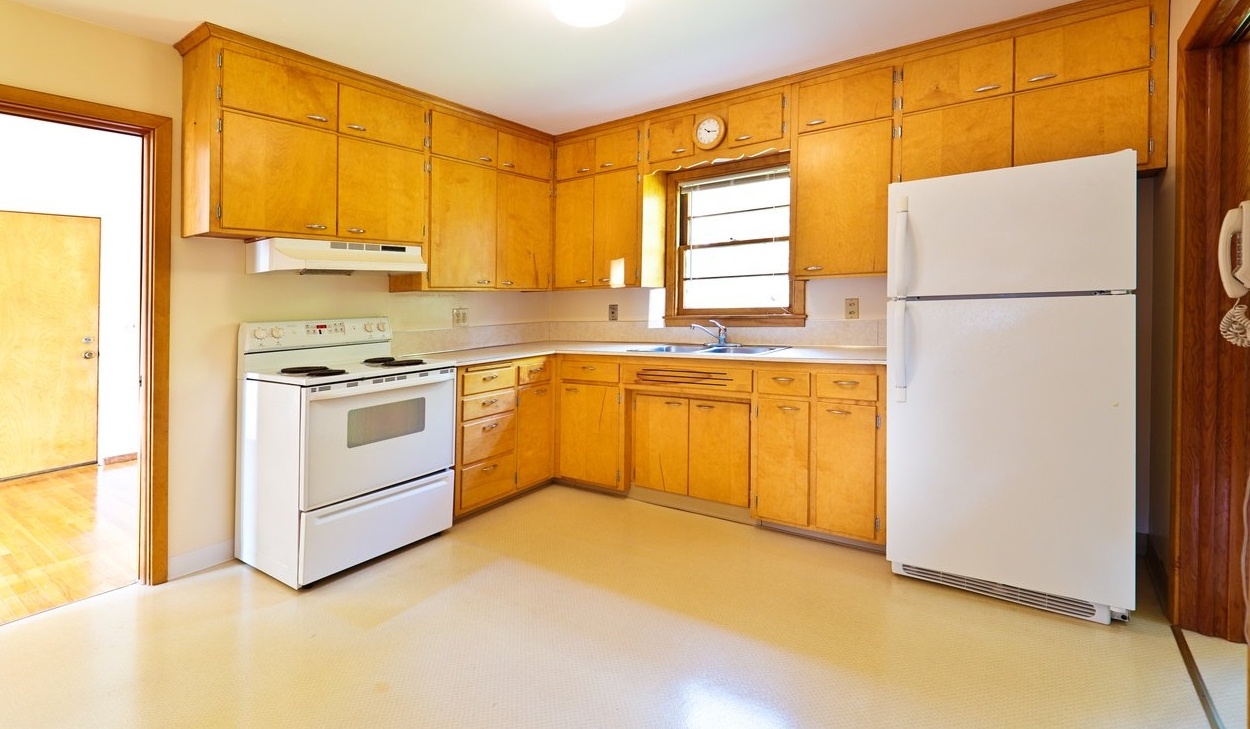Deciding when to unload an investment property isn’t as cut and dry as it may seem. While the obvious reason is to cash out at the right time and — ideally — walk away with great returns, other factors related to performance, investing strategy or life circumstances may motivate you to change up the original game plan.
Quick links:
- Reasons to sell your rental property
- Selling a rental property with tenants
- Selling a vacant rental property
- Tax tip
If you’re waffling about whether it’s time to make a move, two of Roofstock’s resident experts — Enterprise Account Executive Jason Green, and Director of Enterprise Sales Chris Willard — have some advice for you. Below they offer insight into when and why to sell your rental property, along with tips for preparing your property for sale.
Reasons to sell your rental property
You need the capital.
If you’re thinking of pulling out to pay for a major life expense such as college tuition, medical issues, retirement, etc., it’s rational to consider selling your investment property for the extra cash. On the other hand, if you’re looking to unload a perfectly good, cash-flowing investment to pay for non-essential splurges like a submarine sports car, we suggest a little light reading first.
Your property has appreciated.
If your rental has performed well in terms of value appreciation, and you’re happy with what it's appraising at, start by doing some research on your local market to get a better sense of how hot or cold it is. Zillow is a great resource for this, or get in touch with your Roofstock advisor.
“If you see the retail market in the area you’ve invested is slowing down, and your property has appreciated to a level you’re happy with, then it might be a good time to exit,” Green explains.
Flattening rents in a given market may also be a sign that the value of your investment will slow in growth, Green adds. If appreciation rates hit an extended lull, it could be the right time to sell and seize the opportunity to buy in other markets with budding potential.
On the other hand, it could also be a good time to sell when your property begins appreciating faster than market rents increase. That’s because your return on equity (ROE) gets lower as your property appreciates more and more.
According to CoreLogic, single-family rents in the U.S. were up 3.8% year-over-year (as of January 2021), while the NAR reports that median sales price of existing homes increased by 15.8% year-over-year.
To calculate your return on equity (ROE), simply divide your annual profit by your accrued equity.
In the example below, we’ll assume the performance of the single-family rental market stays the same over the next 10 years. If you purchase a rental home for $150,000 with a 25% down payment, your ROE would like this:
| Year | Profit | Equity | Return |
| 1 | $2,000 | $37,500 | 5% |
| 2 | $2,076 | $43,425 | 5% |
| 3 | $2,155 | $50,286 | 4% |
| 4 | $2,237 | $58,231 | 4% |
| 5 | $2,322 | $67,432 | 3% |
| 6 | $2,410 | $78,086 | 3% |
| 7 | $2,502 | $90,424 | 3% |
| 8 | $2,597 | $104,711 | 2% |
| 9 | $2,695 | $121,255 | 2% |
| 10 | $2,798 | $140,413 | 2% |
While it’s true that real estate is a buy-and-hold business, you can see from the above example that when property prices appreciate faster than market rents rise, your return on equity actually declines.
It’s not making you money monthly.
Some rental properties lose money. Like any investment, this is simply part of the risk that comes with the territory.
A few months of negative cash flow isn’t always a reason to sell, however. One of the common mistakes new investors make is calculating their expected annual gross income based on the assumption the property will be occupied for the entire year. But periods of vacancy are normal, as are other scenarios that will put you into the red for a given month.
>>Related: 4 Important lessons I learned during my first year of owning rental property
If frequent tenant turnover becomes a persistent issue for more than a year, it’s time to have a serious discussion with your property manager. Identify the crux of why your property is underperforming — whether tenant or CapEx related — and determine whether it’s worth the time and resources to address it.
If the property’s value has been steadily climbing year over year, and you have the means to cover the mortgage during vacancies, it might be best to ride it out and ultimately reap the continued appreciation. Alternatively, if that’s not the case, it may be time to make a change.
You’ve identified a better investment opportunity.
Maybe your rental property isn’t underperforming, but you’ve identified another property (or portfolio of properties) with the potential to yield more attractive returns over time. This is one scenario where you may want to consider selling your current investment property and “trading up” to a better one through a 1031 exchange.
Also known as a “like-kind” exchange, a 1031 exchange allows you to defer (pay at a later date) capital gains and related federal income tax liability on the exchange of certain types of property.
If you’re primarily investing in single-family rental properties, the 1031 exchange gives you a lot of flexibility to buy and sell assets without having to worry about being taxed at every sale — helping you build a bigger portfolio while deferring taxes along the way.
Normally when you sell investment real estate, you have to pay tax on capital gains and tax on the depreciation recapture. Depreciation is a non-cash expense used to reduce your amount of taxable net income. The IRS allows you to deduct 3.636% of the adjusted basis of your property as a depreciation expense each year for 27.5 years.
Let’s assume that three years ago you purchased a single-family home for $150,000, plus closing costs of $3,750. According to the county assessor, the value of the lot is $10,000, so your adjusted basis used for depreciation purposes is $143,750 ($150,000 purchase price - $10,000 non-depreciable land value + $3,750 closing costs).
Each year you claimed a depreciation expense of $5,218 to reduce your taxable net income ($143,750 x 3.636% = $5,218), for a total depreciation expense of $15,654. Assuming you’re in the 24% tax bracket, your depreciation recapture tax due is $3,757 ($15,654 x 24%).
You also have to pay tax on the capital gain when you sell.
After three years your cost basis after depreciation is $128,096 ($143,750 original basis - $15,654 total depreciation expense). If you sell the property for $164,000 and your closing costs are $13,120, your net sales price is $150,880. Your total gain on the sale is $22,784, which is the net sales price of $150,880 less the cost basis after depreciation of $128,096.
To calculate the capital gains tax due, subtract the depreciation recapture amount of $15,654 from the total gain of $22,784. The balance of $7,130 is subject to a capital gains tax of 0%, 15%, or 20% depending on your income tax bracket. If you’re in the middle capital gains tax bracket, you would owe a capital gains tax of $1,070.
Without doing a 1031 exchange, your total tax due is $4,827: $3,757 from the tax on depreciation recapture and $1,070 from the tax on the remaining capital gain. However, by conducting a 1031 tax deferred exchange, you can defer paying both of these taxes to a much later date.
>>Related: The pros and cons of a deferred 1031 exchange
You want to invest in a different market.
Timing is key when it comes to maximizing returns as a real estate investor. If you’ve identified an up-and-coming neighborhood or emerging market, selling your existing property may be the best way to source the capital needed to get in quickly before everyone else does.
Alternatively, seeking geographic diversification is another sound reason to consider selling your rental property and investing in another market. If your primary residence, income property and job are all located in the same area, you have a lot of concentrated risk and are more vulnerable to the ups and downs of the local economy.
You inherited property.
“Sometimes people inherit rental property they simply don’t want to deal with,” says Green.
If you have zero desire to own an investment property, period, selling might make sense. But if it’s the landlord part you're no so jazzed about, you can always hire a property manager to care for the asset. That way you can enjoy the financial benefits of the investment minus the hassle of the day-to-day operations.
>>Related: How much do property managers charge? Fees and what to expect
You're done with real estate investing.
Maybe you’re simply ready to close the real estate investing chapter of your life. You’ve accumulated a nice nest egg from your rental properties, and you’re ready to cash out. End of story. If that’s the case, good for you — order a mai tai and get to celebrating.
What to do when you’re ready to sell
Selling a rental property with tenants
If you’re selling a property with tenants on a lease, your target buying audience will be other rental property buyers — so take a critical look at the home through the lens of a fellow investor.
“Structural fixes are much more important to an investor than cosmetic changes,” says Willard. “An investor cares a lot more about a well-built roof and central heating than a shiny new countertop.”
These are the sorts of presale repairs and upgrades that help convince potential buyers that the property is a safe investment, and not one where repair costs will put them in the red. Of course, you (or your property manager) will need to let your tenants know that a new owner will be taking over.
“I am into full transparency and fully prepping tenants for where you will need their help,” says Green. “At the end of the day, they are your clients and you want them to be on board with the change of ownership. Plus, a happy and informed tenant is a benefit to the buyer.”
Tip: Roofstock specializes in selling tenant-occupied rental properties.
Reassure your tenants that there will be minimal disruptions during the transition, but also let them know that inspectors and appraisers may need access to the home. Additionally, ask your tenants to point out any existing maintenance issues, and determine whether these needs to be addressed before inspections take place.
“Any major issues that need to be fixed will certainly cause some disruption to the tenant, but those repairs will ultimately make their tenancy and use of the property more enjoyable,” says Green.
When it comes to showing your tenant-occupied property to prospective buyers, the good news is that you don’t have to (literally, at least). The way real estate transacts is evolving rapidly, and with that comes online marketplaces like Roofstock that let buyers virtually tour a home, view inspection reports, and much more without disturbing the tenants or visiting the property in person.
Selling without a tenant in place
In markets where rents have cooled, it might be best to wait until the lease expires. After the tenants move out, you can then list your property on the traditional market.
“In parts of California, Washington, and New York, for example, home values have appreciated dramatically,” explains Willard. “However, rents have not reached corresponding heights. In this situation, single-family rental properties are not as attractive to investors, and the traditional market may be the best option for your bottom line.”
This is when installing that shiny new countertop could make a difference.
“The industry standard is to just slap some paint and new carpet in there,” says Green. “But if you want to add value, cosmetic kitchen and master bathroom renovations are big needle movers for a lot of homebuyers. Consider making simple and affordable changes, like sanding and painting older cabinets and putting in new countertops. Changing out hardware, such as sink faucets, door knobs, cabinet handles, and light fixtures, can help modernize a house on a small budget. Also, never ignore simple curb appeal items, like making sure the lawn is green and trimmed and planting some flowers.”
Tip: Wait until you’ve owned the property for a year.
Whether you’re selling with or without tenants in place, consider this tax tip: Hold the property for at least a year to avoid short-term capital gains. Otherwise, the money you make from the sale will be added to your income, and you will be taxed in whatever bracket you now fit into.
On the other hand, long-term capital gains — including properties owned for longer than a year — are taxed at 0%, 15% or 20% depending on your tax bracket. Waiting a little longer to sell your property could significantly impact how much you’ll be taxed on your income, and potentially save you thousands of dollars.
>>Related: Tax tips for real estate investors, in plain English
*****
Whether you need funds to pursue your doctorate degree or you’re eager to invest in an emerging market before it pops, sometimes selling your rental property is the smart decision. When you’re ready to make an exit, Roofstock can help. From creating an attractive listing, to marketing your property to the best possible audience, to overseeing the entire closing process, we’ll help you save time and money.













